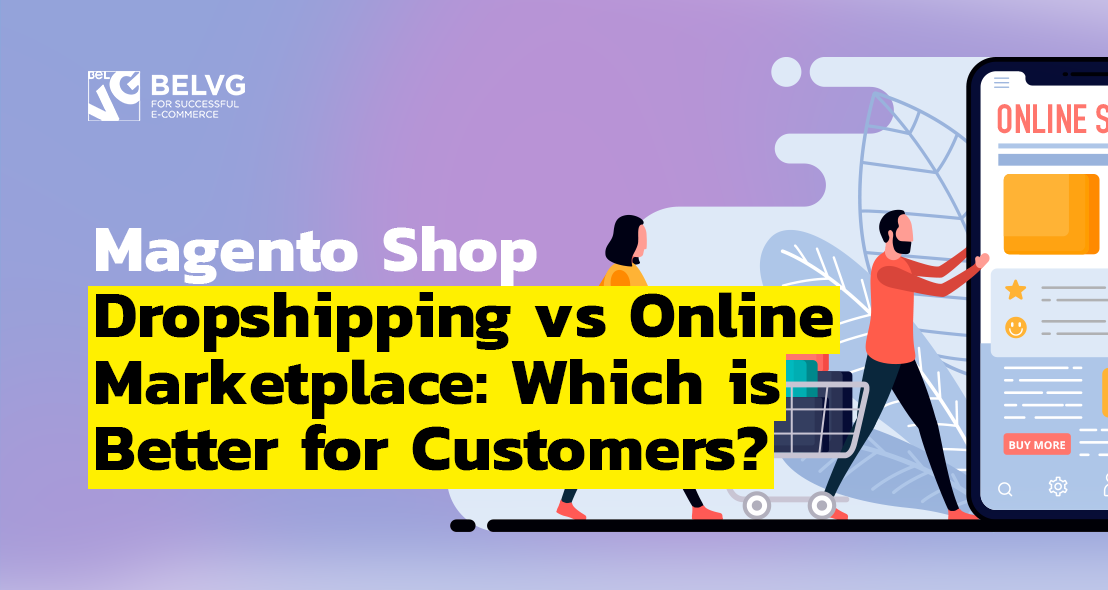
How to start an online business from scratch? This is one of the main questions a future retailer asks himself. Currently, ecommerce comes in a variety of forms, with dropshipping and online marketplaces among the most trending models of organizing online retail. But which one will be the best for your business? Let us explore together.
In this article, you will discover what drop shipping and online marketplace is, get to know the advantages and disadvantages, as well uncover what are the best tools for setting up dropshipping and online marketplaces in Magento.
Table of contents:
What is dropshipping?
Will dropshipping work for your online store?
What are online marketplaces?
Will online marketplaces work for you?
How to start dropshipping with Magento?
How to start an online marketplace with Magento?
Dropshipping or Online Marketplace
What is dropshipping?
Dropshipping is the retail organization and fulfilment method that has been gaining popularity among growing online businesses. A drop shipping store offers the products for sale, but does not keep them in stock to sell directly; instead, it transfers the orders for an item to its manufacturer or wholesaler who themselves deliver the ordered products to the customer.
A dropshipper makes their profit out of the difference between the manufacturer and retail price; however, it is not uncommon for a producer himself to arrange for an agreed percentage in commission to the retailer who dropships their goods.
How does dropshipping work?
This is how orders are typically processed in dropshipping model, step-by-step:
Step #1: Customer makes an order at the dropshipping store and pays for the item.
Step #2: The dropshipping company places the order with the supplier, usually supported by the payment confirmation.
Step #3: The supplier ships the order to the customer, specifying the name and address of the dropshipper at the return address label instead of their own.
Step #4: The dropshipping company alerts the customer about the shipment, sending them a tracking number, if any.
Will dropshipping work for your online store?
The major peculiarity of drop shipping is that the merchant may never handle or physically possess the items they sell, apart from the demonstration copy to show customers in a brick-and-mortar store. The beauty of drop shipping is that, most commonly, the customers will never know that you are just an intermediary between them and the merchandiser.
Despite its seeming simplicity, dropshipping business model has its advantages and disadvantages. So before you decide to implement this business model, it will be wiser to explore them all.
Top 5 Benefits of dropshipping
These are the five reasons why you need to consider a dropshipping model for your Magento online store:
#1: Requires minimum investment.
A traditional retail model requires that a business owner purchased the items themself before selling them, which means spending thousands of dollars on inventory only. With dropshipping, you do not need to own the item to sell it.
#2: Easy to set up and run.
Since you do not possess the products and never handle them directly, you do not need to trouble yourself with managing warehouses, tracking and maintaining the inventory, complicated accounting, shipping the items and handling order returns. Due to this, you run into minimum expenses while conducting your business.
#3: Scalability.
Want expand the assortment and offer your customers twice as many items? Then the only pains you will have to undergo is to make arrangements with the suppliers and process twice as many orders.
#4: Flexible location.
Since your business is not bound to any brick-and-mortar store, warehouse or selling point, your office can be anywhere. You can even have no office and handle the transactions from home – as long as you have the Internet connection and communicate with customers and suppliers freely, your business will be up and running.
#5: Unlimited inventory.
Because you do not need to provide for the inventory and storekeeping of your assortment, there is no limit to the items you can offer for sale.
Top 5 Challenges of dropshipping
There are, however, certain hardships that come with adapting the dropshipping model for your online business. They are the following:
#1: Low profit margins.
In order to survive the tight competition of the dropshipping niche, the retailers are forced to set up minimal retail margins. As a result, for a long time the dropshipping store brings little or no profit to its owners, making them more and more indifferent about the quality of customer service and support.
#2: Supplier-side errors.
As a drop-shipper, you are indirectly responsible for the actions of the merchandiser. If the supplier makes a mistake and fails to deliver the ordered item, the customer will turn their anger towards you, not the supplier.
#3: Working with multiple suppliers.
When you deal with not one, but a number of merchandisers, located in different regions or even countries, you have to keep track of the number of inventories and be constantly aware of multiple shipping provisions and tax systems.
#4: Confusion of customer returns.
Despite the fact that you have never handled the product you sell, in case a person will be dissatisfied with the product and will wish to return it, they will turn to you in the first place. This procedure becomes a source of confusion and conflicts for both customer, merchandiser and retailer.
#5: Legal issues.
As a dropshipper, you may never personally come into contact with the merchandiser whose produce you handle. Therefore, you can never guarantee with all certainty that these items were acquired or produces legally.
What are online marketplaces?
An online marketplace, or virtual marketplace, is an ecommerce website that sells products or services provided by multiple manufacturers or retailers. All marketplace transactions are processed in a centralized way by a single marketplace operator(s), but the deliveries are, most commonly, handled individually, by the vendors themselves. This way, a marketplace does not take on the responsibility over inventory, logistics, product images and descriptions, and pricing, but instead serves as a platform that connects the seller to the customer. Moreover, since there is no uniform model of how an online marketplace should be organized, each multi vendor webstore can contain different capabilities, like auctioning, trade exchange, etc.
Online marketplaces has been around since the days ecommerce began to gain traction. For example, Ebay and Amazon were launched back in 1995, and the Chinese marketplace Alibaba – in 1999. Currently, they are multinational ecommerce web-portals handling millions of transactions each year, serving as a proof of this online retail operational model success. Nowadays, one can find marketplaces that specialize in every kind of consumer goods and services, as well as those who cater for B2B segment.
What is the value of online marketplaces?
According to global research, conducted in 2017:
- Marketplaces cover around 50% of global sales operations online.
- Customers spend approximately $1.5 trillion in online marketplaces.
- 75 largest marketplaces account for over 90% of marketplace transactions.
What kinds of online marketplaces there are?
Online marketplaces come in four main types:
- Horisontal – sell same types of items from multiple vendors.
- Vertical – sell different product with similar characteristics.
- Global – offer all kinds of items without any principal limitations.
- Hybrid – handle both their own products as well as sell items produced by third-party merchandisers.
What are the top online marketplaces around the world?
Ranked by the gross merchandise value (GMV), these five online marketplaces dominate the international online retail:
1.Taobao (China) – $515 million GMV
2. Tmall (China) – $432 million GMV
3. Amazon (US) – $344 million GMV
4. JD.COM (China) – $259 million GMV
5. eBay (US) -$96 million GMV
Will online marketplaces work for you?
What exactly makes online marketplaces so popular and sought after? And does this retail model have any disadvantages and hidden threats? Here is everything you should know about online market places before joining one or launching your own.
Best 5 benefits of online marketplaces
These are the top five reasons why you should consider entering a marketplace:
#1: Less time- and resource-consuming.
An online marketplace is the established ecommerce website with thought-out design, navigation and product processing logic; some marketplaces even have their mobile application. This means that you, as a vendor, can focus on the products you sell instead of maintaining your own online store.
#2: Better brand visibility.
To be accepted to a certain marketplace as a vendor is a stamp of approval, which can help a newly established company or a start-up to get noticed and recognized by its potential customers.
#3: Customer trust.
As a rule, customers find marketplaces more credible and are less reluctant to place an order with the retailer who they have never come across before via an online marketplace.
#4: Enter global markets.
Since most online marketplaces have started to cater for international audience, being a part of a marketplace provides a business owner with a rare opportunity to gain foreign customers and gain world-wide recognition.
#5: Diminished financial risks.
Since a vendor does not invest into inventory, setting up an online store at a marketplace is a far safer option that setting your own online store. Apart from this, you can always take your business elsewhere if the conditions of a certain marketplace will not satisfy you.
Top 5 hardships of online marketplaces
However, online marketplaces may pose certain threads to you as a retailer. This the top 5 challenges you can face if you decide to join an online marketplace:
#1: Highly competitive.
The multitude of vendors presented at a single marketplace creates a cutthroat competition between retailers selling similar products. To withstand the competition, merchandisers are forced to lower their prices and offer discounts, sometimes operating at a loss.
#2: Fees for joining.
To make a profit, online marketplaces charge vendors monthly or yearly fees for using their platform. For some small businesses or startups, the cost of online marketplace membership may be too high.
#3: Rules.
Each virtual marketplace has its own set of rules that a vendor is obliged to follow. Naturally, these policies exist in order to regulate the marketplace operation, yet for some people working under certain constraints may be discouraging.
#4: Conflict of the product presentation
Since marketplace is uniform, you as a product owner rarely have a say at how the items you sell will be presented to your potential customers. Moreover, online marketplace admins have the right to alter product images and description in case it does not conform with the accepted policies.
#5: No Search Engine Optimization.
It is impossible to take the matters of SEO in your own hands and optimize your store for search engines. If the marketplace you sell at has SEO capabilities, you are well set, butt if not – then it will bring no good to your brand recognition level.

Magento Development Services
Take your online store to the next level with BelVG Magento development
Visit the pageHow to start dropshipping with Magento?
Unfortunately, Magento does not have the sufficient in-built designated functionality for dropshipping. But does it mean that this Magento and dropshipping are incompatible? Not at all. With Magento, one can always find a suitable extension to provide for the absent functionality, and the same is true about drop-shipping. The platform’s developers community has created a fair number of dropshipping extensions, available at the Magento marketplace, free and paid.
Top 3 Magento dropshipping extensions
Just choose one of these top dropshipping software and set up your business without lengthy and complicated configurations.
 Dropship. This extension is a sophisticated and intuitive tool to start your Magento dropshipping business. Dropship allows you to connect and partner with any producer of your choice as well as manage the unlimited number of warehouses, price rules, extensive inventory and shipping & delivery methods. Apart from this, the extension has a direct connection to AliExpress, so you start drop shipping with this largest Chinese retail service in no time.
Dropship. This extension is a sophisticated and intuitive tool to start your Magento dropshipping business. Dropship allows you to connect and partner with any producer of your choice as well as manage the unlimited number of warehouses, price rules, extensive inventory and shipping & delivery methods. Apart from this, the extension has a direct connection to AliExpress, so you start drop shipping with this largest Chinese retail service in no time.
Compatibility: Community 2.2.
Price: $249.00.
 Magento 2 Drop Shipping Extension. This extension is not standalone, but a part of the most popular warehouse management tool -Embedded ERP Extension Suite, so if you are using the latter, you will have no problem with operating the Drop Shipping Extension itself. The plugin has a solid stack of features for running dropshipping business online, like supplier stock and price import, automatic selection of the supplier with the lowest price, connection to any FTP server, import history, and so on.
Magento 2 Drop Shipping Extension. This extension is not standalone, but a part of the most popular warehouse management tool -Embedded ERP Extension Suite, so if you are using the latter, you will have no problem with operating the Drop Shipping Extension itself. The plugin has a solid stack of features for running dropshipping business online, like supplier stock and price import, automatic selection of the supplier with the lowest price, connection to any FTP server, import history, and so on.
Compatibility: Community 2.0, 2.1.
Price: $199.00.
 Aliexpress Dropshipping. This is a designated Magento 2 extension for connecting directly with dropshipping Alibaba program. It enables the store admin with a multitude of useful capabilities, like product information synchronization and import, bulk product import and import based on item keywords and URL, and separate cart for AliExpress and Magento 2 Products.
Aliexpress Dropshipping. This is a designated Magento 2 extension for connecting directly with dropshipping Alibaba program. It enables the store admin with a multitude of useful capabilities, like product information synchronization and import, bulk product import and import based on item keywords and URL, and separate cart for AliExpress and Magento 2 Products.
Compatibility: Community 2.0, 2.1.
Price: $299.00.
How to start an online marketplace with Magento?
Magento is a wonderfully scalable ecommerce solution that allows to offer thousands of products for sale and manage multiple web stores from a single admin panel. However, these default functionalities may not be enough if you aim to set up a full-blown multi-seller marketplace. But do not lose faith! In Magento, what does not come as an in-built functionality, can always be integrated into your online store via a specialized extension, and the same goes about the marketplace functionality.
Best 3 Magento extensions for marketplace
Below you will find the selection of three top marketplace plugins. Install a Magento marketplace extension and run your ecommerce smoothly and without hindrance.
 Magento Marketplace Multi Vendor. This extension enables your store with unparalleled multi-vendor support and management. This Magento plugin implements an interactive vendor dashboard for the merchants themselves to add, review and ship their products. A store admin supervises over the marketplace from their own back office and can approve, disapprove and update the product data provided by the manufacturer. All in all, this is a very wholesome solution, packed with multiple outstanding features.
Magento Marketplace Multi Vendor. This extension enables your store with unparalleled multi-vendor support and management. This Magento plugin implements an interactive vendor dashboard for the merchants themselves to add, review and ship their products. A store admin supervises over the marketplace from their own back office and can approve, disapprove and update the product data provided by the manufacturer. All in all, this is a very wholesome solution, packed with multiple outstanding features.
Compatibility: Community 2.0, 2.1, 2.2, 2.3.
Price: $349.00.
 Medma. Medma extension converts your Magento webstore into a capable multi-vendor marketplace. It enables the vendors you work with to independently manage their products (import and export product information, enable and disable products, and so on) and the store admin – to supervise and control this process. The extension also has a built-in system of ratings and reviews that takes customer shopping experience to the next level.
Medma. Medma extension converts your Magento webstore into a capable multi-vendor marketplace. It enables the vendors you work with to independently manage their products (import and export product information, enable and disable products, and so on) and the store admin – to supervise and control this process. The extension also has a built-in system of ratings and reviews that takes customer shopping experience to the next level.
Compatibility: Community 2.0, 2.1, 2.2, 2.3.
Price: $99.00.
 Multivendor Marketplace. This extension offers a comprehensive and solid solution to handling multiple vendor retail. The admin features include bulk import, registration and product approval, ability to manage product and seller reviews and ratings, edit vendor information and so on. Both customers and vendors get their individual back offices, packed with useful features that by times improve their shopping and selling experience.
Multivendor Marketplace. This extension offers a comprehensive and solid solution to handling multiple vendor retail. The admin features include bulk import, registration and product approval, ability to manage product and seller reviews and ratings, edit vendor information and so on. Both customers and vendors get their individual back offices, packed with useful features that by times improve their shopping and selling experience.
Compatibility: Community 2.1, 2.2.
Price: $149.00.
Dropshipping or Online Marketplace: which one is for you?
In the end, it is impossible to say that one online retail model is better or worse than another. Both dropshipping and online marketplaces have their benefits and drawbacks that may be critical to each individual business owner. It is clear that a dropshipping model will suit perfectly those who want to enter ecommerce and have an entrepreneurial mindset, but do not possess any manufacturing facility. If you are, however, an experienced producer and retailer and wish to enter a new level, you can either join a marketplace or even create the one of your own, and the excellent Magento marketplace extensions will assist you.
However, it is up to you to decide. We, in our turn, hope that our comparison will help you make up your mind on which of the two models to implement.
Want to migrate to Magento 2? Turn to BelVG ecommerce development agency and we will assist your online store migration from any third-party online retail solution.

Magento Development Services
Take your online store to the next level with BelVG Magento development
Visit the page









